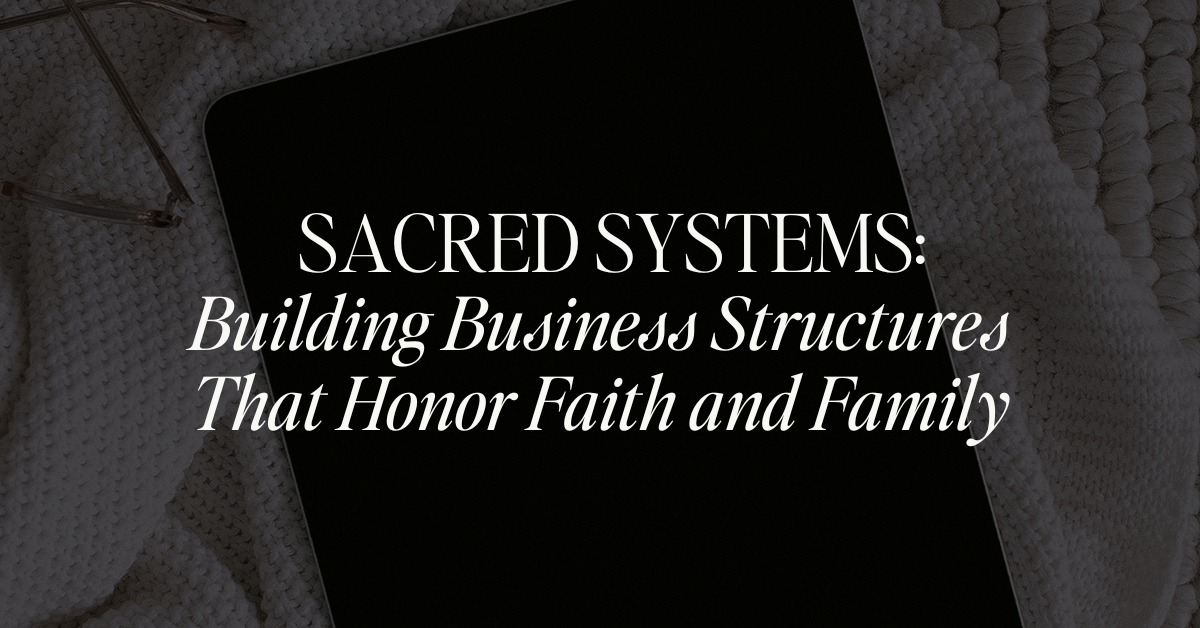Have you found yourself in that moment? It’s 10 PM, you’re still answering client emails, your family time has been sacrificed (again), and despite working longer hours than ever, your business feels more chaotic than controlled. You’re successful on paper but struggling in practice, and that gentle whisper in your heart reminds you this isn’t what God intended for your entrepreneurial journey.
If this resonates, you’re not alone. So many faith-driven women entrepreneurs find themselves caught in a cycle where business growth seems to come at the expense of their God-given priorities and divine callings beyond business. The systems that were supposed to create freedom have somehow created captivity instead.
Here’s what I’ve discovered after years of working with purpose-driven women: the problem isn’t that you need to work harder or hustle more. The issue is that your business systems aren’t aligned with your faith values and the precious priorities God has placed in your life.
When your business operations honor what matters most to you—your relationship with God, your family, your wellbeing, and your ministry impact—something remarkable happens. Not only does your quality of life improve, but your business typically becomes more sustainable, profitable, and impactful too.
“For what will it profit a woman if she gains the whole business world but loses her soul?” This gentle adaptation of Mark 8:36 reminds us of what’s truly at stake when our systems prioritize profit over purpose, hustle over holiness, and growth over godliness.
What if the systems breakthrough you’ve been praying for isn’t about implementing the latest productivity hack or business trend? What if it’s about building thoughtful structures that reflect your faith values and protect what’s sacred in your life?
Let’s explore five biblical principles for creating business systems that honor both your entrepreneurial calling and your most meaningful God-given priorities.

1. Design from Biblical Values, Not Just Efficiency
“But seek first the kingdom of God and his righteousness, and all these things will be added to you.” – Matthew 6:33
The conventional approach to business systems focuses almost exclusively on efficiency—maximizing output while minimizing input. While stewardship matters, women entrepreneurs need systems designed from a deeper foundation: biblical values.
Faith-centered systems begin with clarity about what God says matters most. They’re built to protect and enhance these kingdom priorities rather than subtly erode them in the name of growth or profit.
When you design systems from biblical values, you might implement:
- Clear client boundaries with response time expectations (24 hours, not 24 minutes)
- Tech-free family dinners protected by automatic email responders
- A complete weekend disconnect for rest supported by team coverage protocols
- Meeting-free mornings for focused work and morning devotional time
Consider your own situation:
- What biblical values absolutely must be honored in how you structure your business?
- Which current systems or practices regularly put pressure on your faith priorities?
- How might even small systemic changes better protect what God has called sacred in your life?
- What would a daily schedule designed around your God-given priorities actually look like?
2. Create Sacred Rhythms, Not Just Productive Sprints
“To everything there is a season, a time for every purpose under heaven.” – Ecclesiastes 3:1
God established rhythms—seasons, days, times of rest—as a gift to humanity. Yet many business systems are built on the unsustainable premise of continuous output without adequate restoration, directly contradicting God’s design for women and families.
The biblical principle of rest wasn’t created as a burdensome obligation but as a profound gift that recognizes our human limitations. God Himself modeled this rhythm of work and rest, not because He needed restoration, but because He knew we would.
What might implementing sacred rhythms look like in your business?
- Quarterly prayer retreats where you step completely away from operations to seek God’s direction
- Theme days that group similar activities (content creation Mondays, client work Tuesday-Thursday, admin Fridays)
- A production cycle followed by an integration period with minimal new output
- Designated family days that remain protected no matter what business demands arise
To implement sacred rhythms in your own business:
- Identify your natural energy patterns throughout the day, week, and year
- Design your most demanding tasks around your energy peaks, recognizing God’s wisdom in creating your unique rhythms
- Build intentional restoration periods into your systems, not as “nice to have” but as essential spiritual practices
- Consider how biblical seasons and celebrations might inform your business cycles
- Create clear boundaries between work and rest that your systems actively protect
3. Leverage Technology as a Servant, Not a Master
“All things are lawful for me, but not all things are helpful. All things are lawful for me, but I will not be dominated by anything.” – 1 Corinthians 6:12
Technology offers women unprecedented power to build flexible businesses that honor family responsibilities. Yet without intentional boundaries, these same tools can quickly become sources of distraction, overwhelm, and 24/7 work expectations that pull us away from our primary ministry fields.
The key distinction lies in whether your technology serves your God-given priorities or subtly reshapes them. Does your technology create space for what matters most in God’s economy, or does it fragment your attention and erode your divine assignments?
A faith-aligned approach to technology might include:
- Notification settings that align with your values (family dinner = no notifications)
- Clear technology boundaries communicated to clients during onboarding
- Automation that handles routine communication while preserving human connection for meaningful interactions
- Designated tech-free zones and times in your home and schedule
- Separate devices for work and personal use to create physical boundaries
Consider how you might reassert God-honoring control over your technology:
- Audit how your current tech use supports or undermines your faith priorities
- Identify which technologies create genuine kingdom leverage versus mere convenience
- Design intentional practices around when and how you engage with business technology
- Apply biblical wisdom about boundaries to modern digital tools
- Look for opportunities to use automation as a boundary-protector for what God has called sacred
4. Build Team Structures That Honor Women’s Whole Lives, Not Just Work Roles
“So God created mankind in his own image, in the image of God he created them; male and female he created them.” – Genesis 1:27
As women entrepreneurs, the systems we create don’t just impact our lives—they shape the lives of everyone on our teams. Building structures that honor the full humanity and divine callings of your team members isn’t just ethically sound; it reflects God’s heart for whole-person flourishing.
This principle applies whether you have full-time employees, a network of contractors, or occasional project support. The key question is whether your systems recognize and respect that every woman contributing to your business has God-given priorities beyond their work role
A faith-aligned approach to team structures might include:
- Flexible working hours within clear outcome expectations to accommodate season-of-life differences
- Meeting-free days to allow for focused work and earlier family time
- Paid volunteer hours that support team members’ ministry commitments
- Benefits structured around life needs, including childcare support
- Regular check-ins about workload sustainability, not just productivity
To implement this principle:
- Review your current expectations for team availability and responsiveness through the lens of various life seasons
- Consider how your meeting schedules impact working mothers and caregivers
- Examine whether your compensation systems value results over hours
- Look for opportunities to support ministry priorities that matter to your specific team members
- Design onboarding that establishes faith-based expectations from day one
5. Align Financial Systems with Biblical Prosperity, Not Just Profit=

Few business systems have more power to reveal our actual priorities than those governing money. When financial structures operate in isolation from our faith values, they often drive decisions that undermine what God says is most important.
Biblical prosperity encompasses financial provision but extends beyond it to include relationships, purpose, contribution, and spiritual wellbeing. Business systems built on this broader, biblical definition create God-honoring success rather than hollow achievement.
A faith-aligned approach to financial systems might include:
- Pricing models that value sustainable profit over maximized extraction
- Budget allocations for team development and ministry impact
- Intentional profit margins that allow for generosity and kingdom investment
- Financial metrics that measure impact alongside income
- Payment plans that create accessibility for ministry-focused clients while respecting business needs
Consider your own financial alignment:
- Does your pricing strategy reflect biblical values about provision, generosity, and justice?
- How does your budget allocation reveal what you truly prioritize in God’s economy?
- Do your revenue goals support your ministry vision or potentially compromise it?
- What financial metrics might better capture God’s definition of success?
- How might your financial systems better support what God has called sacred in your life?
Building Your Sacred Systems
Creating business structures that honor your God-given priorities isn’t a one-time task but an ongoing spiritual practice. It requires regular prayer, intentional design, and the courage to operate differently than conventional business wisdom might suggest.
The process begins with clarity about what God has called sacred in your life—what matters so much that you want your business to protect and enhance it rather than compromise it. For most women entrepreneurs of faith, this includes your relationship with God, family relationships, personal wellbeing, community, and living according to biblical principles.
From this foundation, you can begin evaluating your current systems:
- Where do your existing structures create tension with your faith values?
- Which aspects of your business regularly put pressure on your God-given priorities?
- What boundaries need clearer systemic protection?
- How might you redesign daily operations to better reflect God’s priorities?
The most powerful systems honor both your business calling and your other divine assignments rather than sacrificing one for the other. They recognize that God-defined success comes through integration of all your callings, not compartmentalization.
As Proverbs 31 reminds us, a woman of noble character can indeed engage in business and marketplace activities while simultaneously honoring her faith and family responsibilities—but this requires intentional systems that align with godly priorities.
Ready to Create Systems That Honor Your Divine Priorities?
Are you building business systems that protect what God has called sacred in your life, or are your current structures slowly eroding your most important kingdom priorities?
Join our 5 day Grace & Growth Challenge – practical, implementation-focused experiences that help you weave together faith, family, and business.

This isn’t just another business program with a thin layer of faith sprinkled on top. The Grace and Growth Challenge provides you with concrete systems, practical tools, and spiritual guidance to help you build a business that honors all aspects of your divine calling.
Over the course of this transformative experience, you’ll:
- Create aligned business systems that protect rather than erode your most sacred priorities
- Implement practical boundaries that honor both your entrepreneurial calling and family responsibilities
- Develop sustainable rhythms that respect God’s design for work, rest, and restoration
- Build authentic community with other faith-driven women entrepreneurs
- Walk away with both spiritual insight AND practical business tools you can implement immediately
Click here to join the challenge and take a meaningful step toward building a business that honors all aspects of God’s calling on your life, not just the financial metrics.
What tensions have you experienced between your business systems and your God-given priorities? Share your thoughts in the comments below—let’s learn from each other’s journeys!

